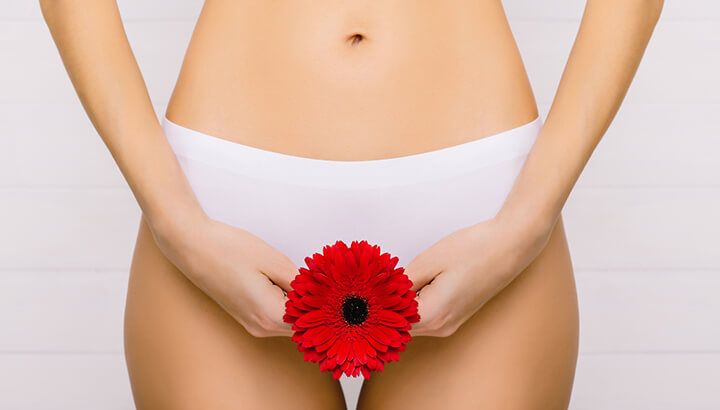There are many great things about maturing, but menopause is certainly not one of them. Everyone experiences symptoms differently, but common issues include pain during sex and vaginal dryness. The good news is, a new care regimen may help mitigate the unpleasant effects of the big change.
What happens to the vagina during menopause?
The outward signs of menopause are easy to spot — hot flashes, irritability, dry skin, fatigue — but they’re all caused by something we can’t see: shifting hormone levels.
As our estrogen levels decrease, the vulva and the lining of the vagina can thin, become drier, and therefore less flexible. Your vagina can also become inflamed. Reduced estrogen levels can cause redness and an abnormal discharge. To prevent, or at least reduce, these and other symptoms of menopause, try some of the following natural remedies.
1. Use a natural lubricant
If you love coconut oil, you’re in luck. It makes a wonderful natural lubricant. It’s also antibacterial and antifungal, so it can help prevent yeast infections. Coconut oil and latex condoms don’t mix, though, so be sure to use a different lubricant if condoms are a part of your routine. Coconut oil can cause condoms to break.
2. Try seed cycling
Seed cycling, or “seed rotation,” can help bring balance to your hormone cycles. For menopausal women — meaning those who are no longer menstruating at all — choose a day to start your rotation. From day one to day 15, make sure you’re eating flaxseed and pumpkin seeds each day (two tablespoons of ground seed for each). The combination will increase your estrogen levels naturally.
Then on day 15 to day 30, consume ground sesame seeds and ground sunflower seeds. Two tablespoons of each, each day, should do the trick. Sesame seeds provide the body with zinc, while sunflower seeds provide vitamin E, two nutrients that help stimulate progesterone production. Add seeds throughout the month to salads, yogurt, smoothies, homemade granola, or gluten-free oats. You probably won’t even notice they’re there.
3. Have more sex
Sure, it seems counter-intuitive to have more sex when it’s uncomfortable, but regular intercourse can help stimulate blood flow and moisture in the vagina. It can also prevent vaginal tightening as the vaginal lining thins with reduced estrogen levels. Think outside the box when it comes to sex and enjoy other sexual activities if intercourse is too painful at first.
4. Moisturize things “down there”
Aloe vera isn’t just for sunburns! When your vulva is feeling dry and uncomfortable, apply a bit of 100 percent pure aloe vera gel around the entire outside of your lady parts. It’s best to use the gel directly from the plant to guarantee it’s pure. If you’ve never used aloe vera straight from the plant itself, test it on your inner elbow first to make sure you aren’t allergic to it. You can also use olive oil to moisturize your vaginal area, but like coconut oil, don’t use olive oil with condoms: they can break.
5. Try eating estrogen-rich foods
Adding estrogen-rich foods to your diet can help keep your vagina healthy during menopause and may even help reduce the occurrence of hot flashes, mood swings, fatigue, and weight gain. In addition to seed cycling, try adding some of the following foods to your diet each week:
- Soy products including tofu, soy milk and soy yogurt
- Peaches
- Strawberries
- Alfalfa sprouts
- Mung bean sprouts
- Green beans
- White beans
- Black beans
- Pistachios
- Walnuts
- Peanuts
- Dried apricots
- Dates
- Dried prunes
- Red wine (in moderation)
- Garlic
6. Wear cotton underwear
White cotton underwear is the healthiest option for underwear, no matter your age. While nylon panties are smooth and feel sexy, if you’re struggling with keeping things in balance down there, scrap them for a bit and try a cotton alternative. If possible, also avoid pantyhose and limit the time you spend in tight leggings. Allowing air to access the area will help reduce inflammation and the occurrence of pesky yeast infections.
7. Go commando at night
Everyone should be going commando at night. It doesn’t mean you have to sleep in the nude, although there are a wealth of benefits to that practice. Simply opt for loose fitting pajama bottoms or cotton boxers to allow your vulva and the surrounding area to breathe. Again, this “airing out” will help the vagina maintain its natural balance and keep infections at bay.
If you experience deep pain or excessive, problematic dryness, consult your healthcare provider. They can help with other solutions and can also rule out more serious problems like endometriosis or chronically low hormone levels. With a few simple changes, you might find that your vulva and vagina feel better than ever.
Have you tried any of these solutions? Leave your comments below!

